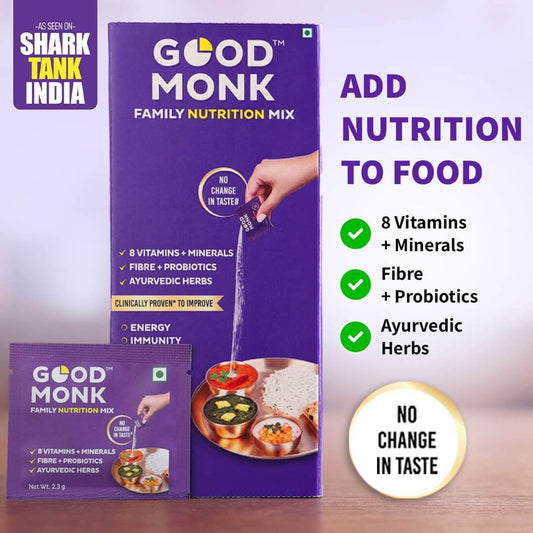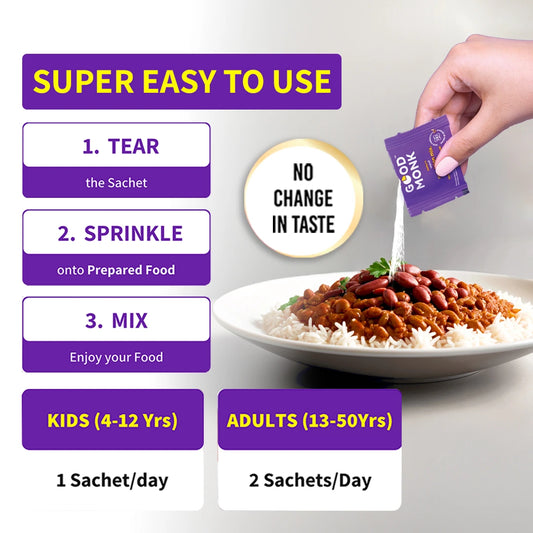We often think about nutrients and superfoods when it comes to eating well. But dietary fiber is also an important component of healthy meal plans. In this blog, Good Monk brings you 30 high-fiber foods that can improve your digestive health and how fiber-rich food and health mix powder from Good Monk can improve your digestive health.
The Digestive Benefits of Fiber-Rich Foods
Before reading about the thirty high-fiber foods, it is important to understand the role of fiber-rich foods in our digestive system. Dietary fiber is also known as roughage. It is the indigestible part of plant-based foods. When you eat food rich in fiber, it removes toxins from your body by pushing them through your digestive system and easing bowel movements.
Adding high-fiber food to the diet can:
Help prevent constipation.
Improve gut health
Aid in healthy weight management
Reduce the risk of developing chronic disorders such as diabetes, heart disease and certain cancers [1].

Fiber Rich Fruits
Fruits are rich in fiber and are a natural way to increase fiber intake. Here are some best fruits that are rich in fiber:
1. Apples
Apples have lots of fiber. An average-sized apple with skin gives you around 4.4 grams of fiber.
2. Berries
You get 5-8 grams of fiber per cup of berries. This includes strawberries, raspberries and blueberries. They also have high amounts of vitamins and antioxidants.
3. Pears
One medium-sized pear with skin can give around 5 grams of fiber. Pears are one of the best high-fiber foods.
4. Bananas
Not many know that bananas are also a high-fiber food. It has 3-4 grams of fiber per fruit.
5. Guava
Guava is one of the most fiber-rich fruits, with 3-4 grams of fiber per medium-sized fruit. It is also rich in Vitamin C.
6. Pomegranate
The small pomegranate seeds have 4 grams of fiber per cup. This high-fiber food also has antioxidants and is good for heart and urinary health.
7. Oranges
Besides being a great source of Vitamin C, oranges offer around 3 -7 grams of fiber depending on its size.
8. Avocados
With 10 grams of fiber in a cup, avocado is another fiber-rich food. The healthy fats in avocados also support heart health.
Fibre Rich Vegetables
Vegetables are another excellent source of dietary fiber. Here are some top choices:
1. Broccoli
Broccoli contains around 5.1 grams of fiber per cup when cooked. It also has other beneficial nutrients, making this food rich in fiber a good choice for optimal digestion.
2. Carrots
Carrots are not just tasty — they’re full of fibre too. One cup, raw or cooked, gives you around 4 grams. Simple everyday sabzi that is so good for digestion.
3. Brussels Sprouts
Brussels sprouts contain about 4 grams of fiber per cup. This high-fiber food is also a good source of vitamins to fortify your digestive tract.
4. Sweet potatoes
Sweet potatoes are more than just tasty. When eaten with the skin, one serving gives you about 4 grams of fibre. Along with that, they’re also rich in beta-carotene. A great choice for high-fiber foods in India.
5. Green beans
Green beans are also good high-fiber food. It has 6 grams of fiber per cup. It is beneficial for digestion and heart health.
6. Beetroot
Beetroot provides 3.8 grams of fiber per cup. It is low in calories and rich in antioxidants and nutrients, making it the best fiber food for weight management and overall health.
7. Leafy Greens
Spinach, kale and other leafy greens have a high fiber content of about 3-5 grams per cooked cup and also come with vital vitamins and minerals.
Legumes: A Fiber Powerhouse
Beans, peas and lentils are often the best high-fiber foods in India.
1. Lentils
Lentils contain around 15.6 grams of fiber per cooked cup. These are also a staple high-fiber food in India.
2. Black Beans
Black beans contribute roughly 15 grams of fiber per cooked cup. This fiber-rich food also has a high protein content.
3. Chickpeas
Chickpeas, or chana, give about 12.5 grams of fibre in one cooked cup. They also have a good amount of plant protein. You can add them to chole, chaat or even your regular sabzi. They keep you full and are good for your health.
4. Peas
Green peas have 9 grams of fiber in each cooked cup, making it a high-fiber food. They also provide a variety of vitamins and minerals.
5. Rajma / Kidney beans
Rajma has around 13 grams of fiber per cup. This high-fiber food is also a good source of plant protein, vitamins and minerals.
Whole Grains for a Healthy Gut
Whole grains like oats, quinoa, and brown rice are high-fibre foods to increase your daily fiber intake.
1. Oats
Oats give you around 16.5 grams of fibre per cup. A bowl in the morning can do wonders for your diet. It’s simple, filling, and helps control those sudden hunger pangs.
2. Quinoa
Quinoa provides around 5.2 grams of fiber per cup, making this fiber food an excellent choice for more whole grains in a diet.
3. Barley
Barley gives about 6 grams of fibre in one cup. It’s easy to cook and blends well with dals, soups or khichdi. Tasty and good for digestion too.
4. Brown Rice
Brown rice has about 3.5 grams of fiber per cooked cup. Making the switch to brown rice can effortlessly boost your daily fiber intake.
5. Ragi (Finger Millet)
Ragi — finger millet— has about 3.6 grams of fibre per 100 grams. It is a gluten-free grain, often used in rotis, dosas or porridge as high-fiber food in Indian meals. Easy to digest and keeps you full for longer for long.
6. Whole wheat flour
Whole wheat flour offers 12 grams of fiber per 100 grams. The nutritious barn and germ make this high-fiber food a better option than refined flour.
Nuts and Seeds with High Fiber Content
Nuts and seeds are a good source of fiber content too.
1. Almonds
Almonds have a fiber content of 3.5 grams per ounce — or about 23 almonds. They're also rich in healthy fats and make for an energizing snack.
2. Chia Seeds
Chia seeds are gaining popularity for their omega-3 fatty acids and fiber, with an impressive 10 grams of fiber per ounce.
3. Flaxseeds
Flaxseeds are high fibre foods that give about 7.6 grams of fibre in just two tablespoons. They also contain omega-3 healthy fats, which are good for the heart. It’s an easy way to add more fibre to your meals.
4. Pumpkin Seeds
Pumpkin seeds have about 5 grams of fiber per one-ounce. This high-fiber food also has nutrients like magnesium and zinc.
Top 10 Fiber-Rich Foods
These are 10 high-fibre foods you can easily add to your Indian meals. They’re simple, tasty, and great for daily fibre intake.
|
Fiber food |
Fiber per 100g |
|
Chia seeds |
34.4 g |
|
Flax seeds |
27.3 g |
|
Whole wheat flour |
12.0 g |
|
Oats |
10.6 g |
|
Black beans |
8.7 g |
|
Rajma or Kidney Beans |
8.0 g |
|
Lentils |
7.9 g |
|
Chickpeas |
7.6 g |
|
Avocados |
6.7 g |
|
Barley |
6.0 g |
How to Incorporate High-Fiber Foods into Your Diet
If you are planning to increase your fiber intake, add high-fiber foods to your diet without upsetting your stomach with the following methods.
Gradually Increase Your Fiber Intake
Switching too fast from a low-fibre diet to a high-fibre one can cause gas and bloating. Increase your fibre intake slowly, so that your body can adjust. If you are just starting, a gut health supplement with prebiotics and fibre can make the change easier.
Plan High-Fiber Meals and Snacks
Add more fibre-rich foods to your daily meals. Try vegetable-loaded stir-fries, mixed bean salads, or a bowl of oats in the morning. Snack on fruits, nuts, or seeds—they’re simple and effective. If you’re over 50, consider adding the best multivitamin for old age to meet your extra nutrient needs.
The Health Benefits of a High-Fiber Diet
A high-fiber diet does a lot for your body. It supports health in more ways than one. Here’s how it helps:
Improved Digestion and Regularity
A diet rich in fiber can ease and regulate bowel movements. It will be an effective solution for both constipation and diarrhoea.
Lower Risk of Digestive Disorders
Fiber helps keep your stomach and gut healthy in the long run. Studies show it can cut down the risk of problems like piles, diverticulosis, and even colon cancer [2][3]. Good fibre keeps your stomach happy and your digestion strong.
Weight Management
High fiber foods can make you feel full for a longer time and thus lower your calorie consumption. They are also naturally lower in calories. All of this will benefit in healthy weight management.
Diabetes Control
Our body doesn’t break down and absorb fiber. So, unlike other carbohydrates, fiber-rich food doesn’t cause sugar spikes. Fiber also slows down the absorption of sugar into the bloodstream.
Natural Detox
Insoluble fiber moves faster through your intestines and cleans your colon. High-fiber foods support bowel regularity and flush out toxins effectively.
Conclusion
Adding fiber-rich foods to your diet is a simple yet effective way to support digestive health. By adding variety through fiber-rich foods like fruits, vegetables, legumes, whole grains, nuts, seeds or dietary fiber supplements, you get both fiber and essential nutrients. Start today with Good Monk’s fiber-rich nutrition mixes.
Frequently Asked Questions On Fiber-Rich Food
1. What fruit is good for digestion?
Fruits like apples, pears, bananas, guava and oranges are good for digestion. Fiber-rich food helps to keep your gut healthy.
2. What are fiber foods?
Fiber foods are foods that contain dietary fiber. This includes fruits, vegetables, whole grains, legumes, nuts and seeds.
3. What foods are high in fiber?
Some of the high-fiber foods are oats, lentils, black beans, chia seeds, avocado and apples. Including a mix of these fruits, vegetables, whole grains and legumes in your daily diet can increase your fiber intake.
4. How to increase fiber?
Add more fruits, vegetables, whole grains, lentils and beans. Snack on nuts and seeds, which are some of the best high-fiber foods.
5. Is fiber good for weight loss?
Yes. Fiber is good for weight loss. Fiber-rich food keeps you full for longer, helping you control your intake. It also supports better digestion.
About the Author
Written by the team at Good Monk—a clean and honest nutrition brand supported by doctors and food scientists. Every product is backed by clinical studies and made to help families eat better, feel better, and live healthier every day.
References
[1] Kaczmarczyk MM, Miller MJ, Freund GG. The health benefits of dietary fiber: beyond the usual suspects of type 2 diabetes mellitus, cardiovascular disease and colon cancer. Metabolism. 2012;61(8):1058-1066. doi:10.1016/j.metabol.2012.01.017 https://pmc.ncbi.nlm.nih.gov/articles/PMC3399949/
[2] Kunzmann AT, Coleman HG, Huang WY, Kitahara CM, Cantwell MM, Berndt SI. Dietary fiber intake and risk of colorectal cancer and incident and recurrent adenoma in the Prostate, Lung, Colorectal, and Ovarian Cancer Screening Trial. Am J Clin Nutr. 2015;102(4):881-890. doi:10.3945/ajcn.115.113282 https://pmc.ncbi.nlm.nih.gov/articles/PMC4588743/
[3] Gill SK, Rossi M, Bajka B, Whelan K. Dietary fibre in gastrointestinal health and disease. Nat Rev Gastroenterol Hepatol. 2021;18(2):101-116. doi:10.1038/s41575-020-00375-4 https://pubmed.ncbi.nlm.nih.gov/33208922/










